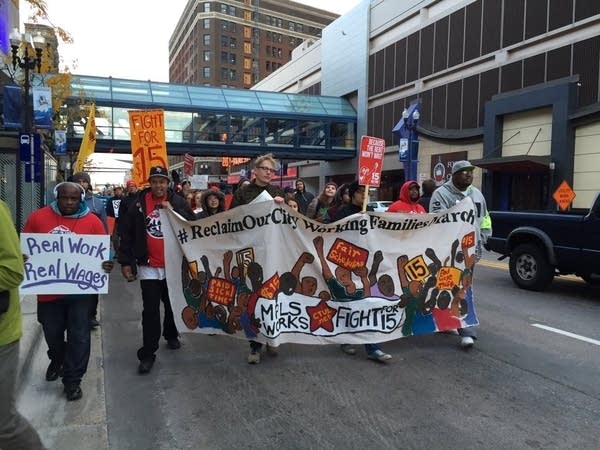Workers march through Minneapolis for wages, scheduling

Go Deeper.
Create an account or log in to save stories.
Like this?
Thanks for liking this story! We have added it to a list of your favorite stories.
Updated: 2:43 p.m. | Posted: 7:55 a.m.
Fast-food workers and their supporters marched in Minneapolis Tuesday morning to demand higher wages, fair scheduling and safe workplaces.
The efforts come just a month after city leaders stepped back from some provisions that would have required more benefits for workers.
Turn Up Your Support
MPR News helps you turn down the noise and build shared understanding. Turn up your support for this public resource and keep trusted journalism accessible to all.
The labor group began its march at the McDonald's in Northeast Minneapolis at 6 a.m. and pointed its banners along University Avenue toward Minneapolis City Hall.

Nearly 200 marchers — some carrying children, some carrying signs, some singing or playing music — had joined the demonstration by the time the group reached University and First Avenues. They chanted in Spanish and English, and called for a $15 an hour wage.
Christina Cortez, a shift manager at the McDonald's at Abbott Northwestern Hospital, said it's taken nine years of work at the company for her to earn $11 an hour.
With three daughters, Cortez said, it's a struggle. No sick time, no holiday pay, no time-and-a-half for overtime makes it hard to miss a day of work, she said.
"I'm working check after check," she said. "I still struggle keeping food on the table and making sure my kids have somewhere to sleep at all times."
For Dennis Bradley, who's been working at the Burger King on Washington Avenue for three months, the biggest issue is scheduling.

At $9 an hour, he said, the few days a week he's able to get on the work schedule aren't enough to make ends meet.
"I've got a mother and a sister. We all live check to check," he said. "I get paid this week right away, but I owe them for money I borrowed last week to help support my children. ... It's all a big puzzle."
The demonstration was organized by the Twin Cities-based Centro de Trabajadores Unidos en Lucha, as part of a nationwide demonstration Tuesday to demand a $15 wage.
"The only way we make change is by going on strike or by supporting people," said Aaron Johnson-Ortiz, an artist who helps CTUL with some of its design work. He was not on strike, but called himself an allied member of the group. "I think the political process is important, but it's secondary to people's actions on the streets."
The fast-food workers group met up with retail janitors, who were also demonstrating for wages and working conditions, outside the downtown Minneapolis Macy's on Nicollet Mall, where they were joined by U.S. Rep. Keith Ellison.
"I'm standing with the workers," he said. "I'm on the side of the workers."
National organizers estimate that fast-food workers were protesting in nearly 300 cities across the country.
Ellison said he sees a movement building as workers in different industries and in different cities realize they're not the only ones trying to survive on low wages.
"These rallies are showing them, 'I'm not alone, I'm not by myself,'" Ellison said. "'I'm going to take chance.'"
Steven Suffridge, who works at a McDonald's in south Minneapolis, said he started out making $8 an hour, but received a raise after the state's minimum wage increased to $9 an hour. Suffridge said some of his co-workers are scared of the repercussions of publicly supporting the union effort, but that he believes they need to take a stand in order to improve their lives.
James Matias works as a security guard and turned up to the protest to show support for the fast-food workers and janitors.
"Just to see folks who also are going through the same issues, and understand what you're going through, helps out," Matias said. "[It] puts you in a better position to say, it's not just me, it's our community."
Ellison connected the aims of the marchers to the work of Black Lives Matter.
"Black Lives Matter is a part of this overall movement for social and economic justice all over this country," he said.
The group blocked some streets as it moved through downtown. Minneapolis police escorted the demonstrators as they marched.
A push for mandatory four-week scheduling earlier this year in Minneapolis fell short in the face of widespread business opposition.
At the closing rally in Minneapolis City Hall, speakers urged protesters to spread the word about the actions, and urged them to become even more engaged in the political process.



